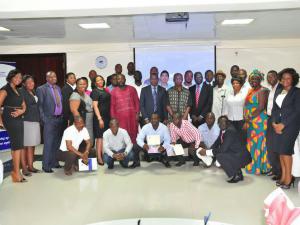- Home - News
- TWI News | TV
- Polls
- Year In Review
- News Archive
- Crime & Punishment
- Politics
- Regional
- Editorial
- Health
- Ghanaians Abroad
- Tabloid
- Africa
- Religion
- Election 2020
- Coronavirus
- News Videos | TV
- Photo Archives
- News Headlines
- Press Release
Business News of Friday, 19 September 2014
Source: BFT
Banking confidence bounces back...as forex inflows improves
The Managing Director of Energy Bank, Samuel Ayininuola has noted that reviewing the Bank of Ghana’s directive on foreign exchange transactions in the country has helped to boost confidence in the banking system, leading to an increase in forex inflows and the recent decline in bank rates.
Mr. Ayininuola told the B&FT on the sidelines of the bank’s customer forum in Tema that the directive’s reversal is timely and smart as confidence in the banking system was waning, a situation that made foreign exchange account holders keep their foreign currencies outside the country’s shores.
“It was clear the earlier moves from the Bank of Ghana on forex transactions were not working, and with BoG being a listening regulator, the directives were reversed. I think customers are now more comfortable, and as a result of the renewed confidence, forex inflows have increased while bank rates are declining -- and this trend is expected to continue.
“When it continues like this, people will bring more money into the system apart from the syndicated and cocoa monies that will come in. As we can see, the cedi has started appreciating against its trading currencies; it is now Ghc3 against the dollar, and it can even get better now than before the end of the year,” he said.
The Bank of Ghana last month reviewed the directives it introduced in February this year in an attempt to shore-up the local currency against the dollar and other major foreign currencies. The directive, among other things, placed a limit of US$1,000 on over-the-counter foreign exchange cash withdrawals in the country’s banks.
The International Monetary Fund (IMF), which is currently negotiating with government on how to support the country’s economic programme, was among critics that expressed doubt about efficacy of the central bank’s regulations to stem the devastating fall in the cedi at the beginning of the year.
For the first eight months of the year, the cedi depreciated against the US dollar by about 30 percent as per Bank of Ghana data; while other economists have pegged the rate of depreciation at 40%. Inflation also hiked from 13.8% in January to 15.9% in August while the central bank increased its policy rate to 19%.
According to Mr. Ayininuola, Ghana’s current economic challenges are not unique and require a prudent economic approach to fix them; with the support of all stakeholders.
“Ghana’s economy now is tough, but it is a general problem; those countries that are supposed to be giving aid and grants have also been hit and are facing economic hardship. Ghana is not in isolation, it is part of this global village.
“What is needed is not politics, this is economics; it is for everybody to rally round and make some sacrifices to move the country forward,” he said.
The bank’s customer-forum provided an interactive session between the bank’s top management and customers towards superior product and service delivery for a win-win relationship.
Mr. Ayininuola said the event was key to the bank’s customer service agenda as it enabled the bank to solicit specific information that will inform innovation when designing new products: “Energy Bank is not in there just to make profit; we also want to ensure growth for the business of our clients.
“We believe this engagement will help us design products that will be beneficial to economic growth by empowering our business clients. This is how we want to promote a win-win business engagement with clients.”
Deputy General Manager of Energy Bank, Isaac Shedowo, said the bank will continue to support growth and development of the national economy as it supports customers to meet their varied aspirations.
He said the bank plans to embark on an aggressive branching-out exercise to extend its networks across the country, and will also roll-out more ATMs to offer convenient banking to customers.











